“I have come to a conclusion that is important to me. I no longer believe that the momentum of a life headed in a worthwhile direction ends when that life does.
“I will never know how much good surrounding me is a legacy of Jesmin’s life. Her future will be invisible to me. But invisible is not the same as nonexistent. I will know that her deeds and accomplishments still move among us, phantoms that represent everything good the New Republic stands for, and I am grateful for it.
“That, at last, was what he meant to say.”
–Wraith Squadron, by Aaron Allston
If you’d told me when I started Eleven-ThirtyEight that would be find ourselves eulogizing two different people in our first eight months, I don’t know what I would have thought. Nevertheless, that’s now transpired—first Ann C. Crispin, author of the Han Solo Trilogy, passed away last September, and now Aaron Allston, ten years Crispin’s junior, has met the same fate.
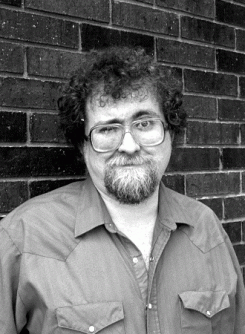 I started this site because I sensed a sea change coming in the wake of the Disney acquisition, and I wanted to ensure myself and some of my friends a seat at the table in setting the tone of fandom in this brave new world of sequel films and potential reboots—but never did I consider that we’d be entering the Sequel Era without Aaron Allston on our team. His work in the Star Wars Expanded Universe spans two different publishers, several decades in-universe and close to twenty years in reality; if one were inclined to pick a single EU author as The Voice of the Galaxy Far, Far Away up to this point, Allston would be right up there with Zahn or Anderson or Denning or Luceno, yet it’s always been very easy, even for his fans, to write him off as “the humor guy”.
I started this site because I sensed a sea change coming in the wake of the Disney acquisition, and I wanted to ensure myself and some of my friends a seat at the table in setting the tone of fandom in this brave new world of sequel films and potential reboots—but never did I consider that we’d be entering the Sequel Era without Aaron Allston on our team. His work in the Star Wars Expanded Universe spans two different publishers, several decades in-universe and close to twenty years in reality; if one were inclined to pick a single EU author as The Voice of the Galaxy Far, Far Away up to this point, Allston would be right up there with Zahn or Anderson or Denning or Luceno, yet it’s always been very easy, even for his fans, to write him off as “the humor guy”.
Now that the franchise, and the fandom, and the world at large, have been robbed far too early of benefit of Allston’s continued presence, it would do us well to reflect on the totality of the man—his talent, his character, and his legacy.
Joining me in doing so are staff writers Lucas Jackson, Lisa Schap, and Jay Shah, and longtime guest contributors Becca Hughes and Nick Adams. I’ll be back for more of my own thoughts at the end. –-Mike
Lucas: Aaron Allston was (it’s hard to say, that was) a singular talent. Nobody else could do what he did. His books were not only side-splittingly hilarious, they were also profoundly moving. Allston had a unique ability to mix up outrageous comedy, deep emotion, lighthearted adventure, and psychological characterization in a way that felt completely harmonious and natural. It’s a tricky balancing act, and I’ve never seen anybody else — not just in Star Wars, but of all authors — strike that balance as well as Allston did.
The result of that balancing act at its best was Allston’s original run of X-Wing books, which stand among the absolute masterpieces of the Expanded Universe. In his Wraith Squadron books, Allston really put on a show, delivering a massive cast of multidimensional characters, well-crafted plotting, gut-busting comedy, and moments of profundity. We remember that series for Wedge, Face, and Donos’s Agamrian impressions; for Ton and Face’s banter; for Lieutenant Kettch, but we also remember it for Ton Phanan’s death, for Wedge’s letter to Admiral Ackbar, for Myn Donos’s PTSD. With Starfighters of Adumar, Allston brought together the X-Wing all-stars for one of the most perfect standalone novels of the Expanded Universe, an uproarious adventure on a planet with serious issues. And it was that ability to mix joy and sorrow that made Aaron Allston a perfect fit for The New Jedi Order. I don’t think it’s any coincidence that Allston was the author chosen to begin the process of turning the tide after the emotional devastation of Star by Star, to remind us that our heroes can and will win, to put a smile back on our faces, to light the beacon of hope for the galaxy. Even in the lesser series that followed, Allston remained our beacon of hope. As the leadoff writer, he set those series up to succeed, and did his best to keep up the fun, to give us the characters we loved and the Star Wars galaxy we deserved, throughout. His entries remain the bright spots of Legacy of the Force and Fate of the Jedi. And Allston went out on a high note with X-Wing: Mercy Kill, a bold and bright return to fan-favorite characters that was exactly what the franchise needed. His body of work is truly incredible, and even though he’s now gone, it will stand forever as a tribute to his magnificent talent.
A brilliant author who gave so much joy to his readers, Aaron Allston will surely be missed. I’ve already seen outpourings of grief among the fan community that make it clear just how beloved he was, how much his books meant to us, and how kind and generous he was toward his legions of fans. I myself never met him, but when I heard that he had passed away, it felt like a favorite uncle had died. That’s the kind of connection his books created. Allston’s personality, his humanity, burst off the page. When I was a kid, when I was a teen, and now that I’m an adult, Aaron Allston has always been there, for sixteen great years, making me laugh and making me cry. Now he’s made me cry one last time.
Lisa: Many of us and our readers have almost certainly had a similar experience with Aaron Allston. I was 14 years old when Wraith Squadron was released and after reading it spent the next decade and a half eagerly awaiting new books by this fantastic author. The X-wing series as a whole is something I reread each year because I enjoy it so much and part of what makes it so enjoyable is how much life Allston brings to the characters in his books of the series. There isn’t another author that I read in this genre that is able to combine humor, plot and depth like Allston 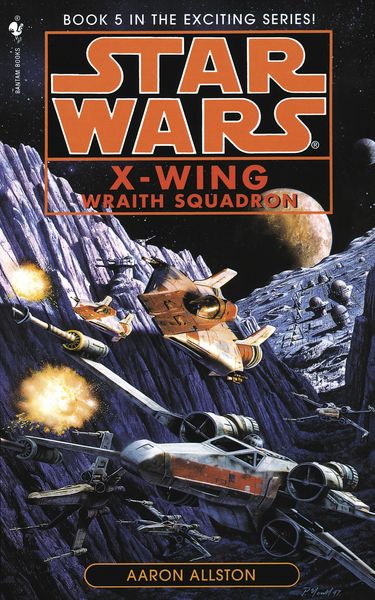 could and the Star Wars Universe is going to be mourning his death for a very long time. I still can’t do a write up without crying and I specifically waited in the hopes that I could but this man had such an impact on my life from his contributions to the Star Wars Universe that I don’t think his death is something I will ever truly get over.
could and the Star Wars Universe is going to be mourning his death for a very long time. I still can’t do a write up without crying and I specifically waited in the hopes that I could but this man had such an impact on my life from his contributions to the Star Wars Universe that I don’t think his death is something I will ever truly get over.
Starfighters of Adumar is and always will be considered one of my favorite books. There are so many quotable lines in it that I usually can’t go throughout the week without using one in my head to cover a situation I find myself in. Sometimes a simple “Boom” is all one needs to say. I think it is very telling of a author whose characters find themselves into other author’s stories and we tended to see many of the Wraiths and Rogues in their later years because they were so well developed when they were introduced to the readers that it is difficult to ignore the fact that those characters still exist in universe.
I am lucky enough to have had the pleasure to interact with Allston several times. The first time my eyes were really opened to how great of a person he was is when he agreed to talk with the Literature users from TFN in our chat room after a book was released. We were unmoderated and allowed to ask any questions we wanted to. He did his best to answer everything and as always inserted humor where appropriate. This was one of my first experiences with an author and I became addicted. These authors have been my heroes for so many years and provided me with countless hours of entertainment through their character and stories. I was amazed to find them so down to earth and in Allston’s case a true Star Wars fan like myself.
Then I got to meet him at Celebration 5 in Orlando. I was so nervous as I presented a well-worn copy of Starfighters of Adumar for him to sign even apologizing for the state of the book. He looked up with a smile on his face and said that just let him know how much I enjoyed the book. He signed it with a “Yub, yub” one of my favorite phrases and this man was put on an even bigger pedestal in my eyes as a reader and fan.
I’m pretty sure I could go on and on about the impact this man had on my life. He, who was so full of life, and who created characters to be so full of life is no longer here and that is a hard thing for me to accept right now. I will be forever thankful to Allston for spending so many years of his life furthering the Star Wars Universe in such a memorable way.
“Yub, yub, commander.”
Becca: I didn’t want to read the X-Wing novels. I resented them for being about pilots I’d never heard of instead of Luke and Han and Leia. I was a kid and I wanted more of the “real” story. It didn’t matter how many people told me they were great books (and people did), or how funny they were, or how well-written, I looked at those covers and saw soldiers and aeroplanes when I wanted mystic knights.
I ended up buying Wraith Squadron because it was 50 pence in a charity book shop. Allston’s X-Wing novels remain the only Star Wars novels that have made me cry. For Lara Notsil and who she couldn’t choose to be. For Ton Phanan and the life he couldn’t live. They were beautiful, funny, innocent and heartbreaking. They were brutal. They were wonderful books. I was won over in an instant.
We all were. We loved him. In a community with more than its share of polarising literary figures, Aaron Allston was never one of them. I think his ability to mix humour and drama in a way that heightened both, and his deft touch when it came to characterization, help explain why.
I hope he is resting peacefully.
Jay: One of the most remarkable things about Aaron Allston was that he was known among the Star Wars fandom not just because he was an author of a highly regarded set of books, but also that he was renowned and respected simply as a person. Here are a handful of stories and experiences that my friends and I had with Aaron Allston.
I only met him a few times — at various Star Wars Celebrations. He was one of the first VIPs that I approached at my first Celebration in 2005. I was pretty young at the time, and it was incredibly intimidating to approach an actual author: especially the author of my favorite books in the Star Wars canon. He made it easy though — he was incredibly approachable and very friendly. He fielded awkward fan comments easily and tried to engage them in conversation. When I told him how much I appreciated his handling of the villains in his books, he replied by explaining his thought process in creating antagonists: how he thought villains ought to be treated like people too and written accordingly. It’s such a little thing and obvious to people who know his writing, which excels in characterization and the creation of a memorable ensemble case, but the fact that he engaged his fans in discussion about the craft of writing set him apart. It made it clear that he was not just a typical convention VIP, there as an obligation, but that he enjoyed interacting with his fans and discussing the craft of writing with them.
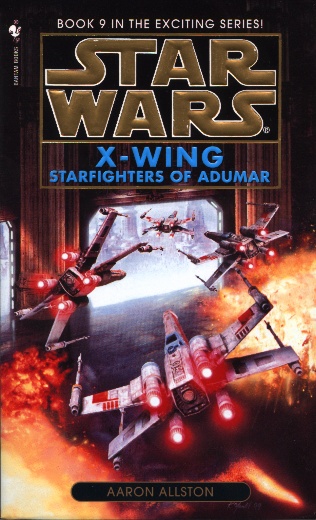 Indeed, he often appeared on the convention circuit hosting panels on writing — sometimes alongside other Star Wars authors such as Michael Stackpole or Timothy Zahn. He eagerly shared his tips and experiences in writing, and I’ve heard from several people that these panels were not to be missed. Several of my friends made annual appearances at these more general fandom conventions, and they always told me how Allston also made regular attendance at these conventions. He would go out to brunch with his fans, or hang out with them after his panels are finished. He would pose for photos and chat amiably with all comers. To those friends, he was basically like a family member they saw every year and they feel his loss keenly.
Indeed, he often appeared on the convention circuit hosting panels on writing — sometimes alongside other Star Wars authors such as Michael Stackpole or Timothy Zahn. He eagerly shared his tips and experiences in writing, and I’ve heard from several people that these panels were not to be missed. Several of my friends made annual appearances at these more general fandom conventions, and they always told me how Allston also made regular attendance at these conventions. He would go out to brunch with his fans, or hang out with them after his panels are finished. He would pose for photos and chat amiably with all comers. To those friends, he was basically like a family member they saw every year and they feel his loss keenly.
What sets him apart to me, though, is the response another one of my friends had to his death. She told me that she had never even read any of his books, but saw him attend TheForce.Net’s Star Wars Celebration parties: he would show up hours early to interact with the fans who were laboring to set up the party, he would attend the entire time and engage everyone in conversation, and he would stay after. He would be friendly, engaging, and funny. And that’s the thing — as much as I appreciate his writing (and I appreciate it a lot: I would not have met a good many of my friends if not for our common appreciation for his stories and characters), I appreciate his qualities as a person more.
One last story. When I had missed out on a convention that I eagerly wanted to attend due to difficult personal circumstances, my friends arranged for Allston to call me from the convention and taunt me about all the fun I was missing. It was all in good fun, and I appreciated that my friends had wanted me to feel like I was there (if just for a moment) and to be aware that my friends were thinking of me. Allston was always willing to play along, and he appreciated what it was like to miss out on something. He was totally happy to help.
All in all: he was a fundamentally kind-hearted, good man with a wonderful sense of humor and a great presence. And as the others have said, he wrote wonderful, wonderful books which almost everyone appreciated.
Nick: The passing of Aaron Allston, especially at this time of uncertainty about the future of the Expanded Universe, has welled up in me all sorts of memories about the “Golden Age” of Star Wars fiction. Aaron was no small part of this era, with his books often topping the list of best EU novels among fans. His writing spanned multiple periods, from the Bantam books of the New Republic to the New Jedi Order series to the post-NJO. Even when the plotlines of the post-NJO period took a turn that many fans disliked, there was near unanimous agreement that Aaron’s books were the best, both in tone and content. Aaron was able to write so well on so many levels. His ability to write out complicated action scenes, complete with elegant dogfights and crashing clashes among capital ships, is the standard that all authors should be judged on. His ability to flesh out characters, whether human, Mon Calamarian, Gamorrean, or any other species, made both his own creations and those of other authors (or even George Lucas 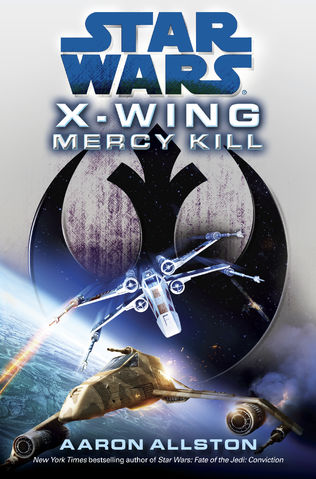 himself) pop from the pages and feel like people we could relate to. Most of all, Aaron possessed an uncanny ability to weave humor into Star Wars stories that remains unmatched by anyone, anywhere. The witty quips, the funniest lines, and the most outrageous plots often came from Aaron’s pen.
himself) pop from the pages and feel like people we could relate to. Most of all, Aaron possessed an uncanny ability to weave humor into Star Wars stories that remains unmatched by anyone, anywhere. The witty quips, the funniest lines, and the most outrageous plots often came from Aaron’s pen.
In his last EU work, X-Wing: Mercy Kill, the final sentence of the book is “He’s smiling”, in reference to Voort “Piggy” saBinring. It struck me as incredibly appropriate and fitting that the final words of Aaron’s last Star Wars novel involved a smile. Aaron has made countless fans like myself smile numerous times over the years. The smiles that his works have created over the years are his lasting legacy. Today, as I remember this great author, I can think of no better tribute than to glance at my bookshelf, focus on the row containing his many works, and smile.
Aaron, I imagine you are smiling in the next life. Thank you for so many wonderful memories. Rest in Peace.
Mike: When I think about Aaron Allston’s body of Star Wars work, the character I always come back to is Joram Kithe.
In his Star Wars Insider short story The Pengalan Tradeoff, Kithe is a Republic accountant tasked with auditing the effectiveness of the clone army in advance of further investments. Think about that for a minute: someone at Lucasfilm said “hey Aaron, want to write a short story about the Clone Wars?”, and of all the possibilities contained therein, the man went straight to accountant.
That’s what really stands out to me about Allston’s writing—it’s funny, sure, but a big part of the humor comes from a seemingly pathological tendency to choose the least likely focus characters imaginable. I’m known around the TFN forums as the guy who won’t shut up about diversity, but as a good ol’ white male human my own self, I’ve always had to admit that it’s not coming from any deep-seated desire for representation on my own part, but from the fact that I’m easily bored, and a galaxy full of people who look like Channing Tatum’s stunt double just isn’t interesting or believable to me.
So when I pick up a book like Wraith Squadron—the whole premise of which is a gathering of misfits—and I find a cyborg with a Bacta allergy, a Gamorrean Algernon, and a horse pilot who barely fits in his X-wing, I am a happy man. I like to think that Allston was like me; he envisioned a Star Wars galaxy as diverse as it was whimsical, and over the course of more than a dozen novels and short stories, he ensured that the galaxy he left behind would be just that.
And if, indeed, this year brings us not just Allston’s passing, but the end of the decades-long canon he brought so much joy and wonder to, I like to think that I’ll take one last good look around, and think to myself, “Pretty. What do we blow up first?”
 So that happened.
So that happened.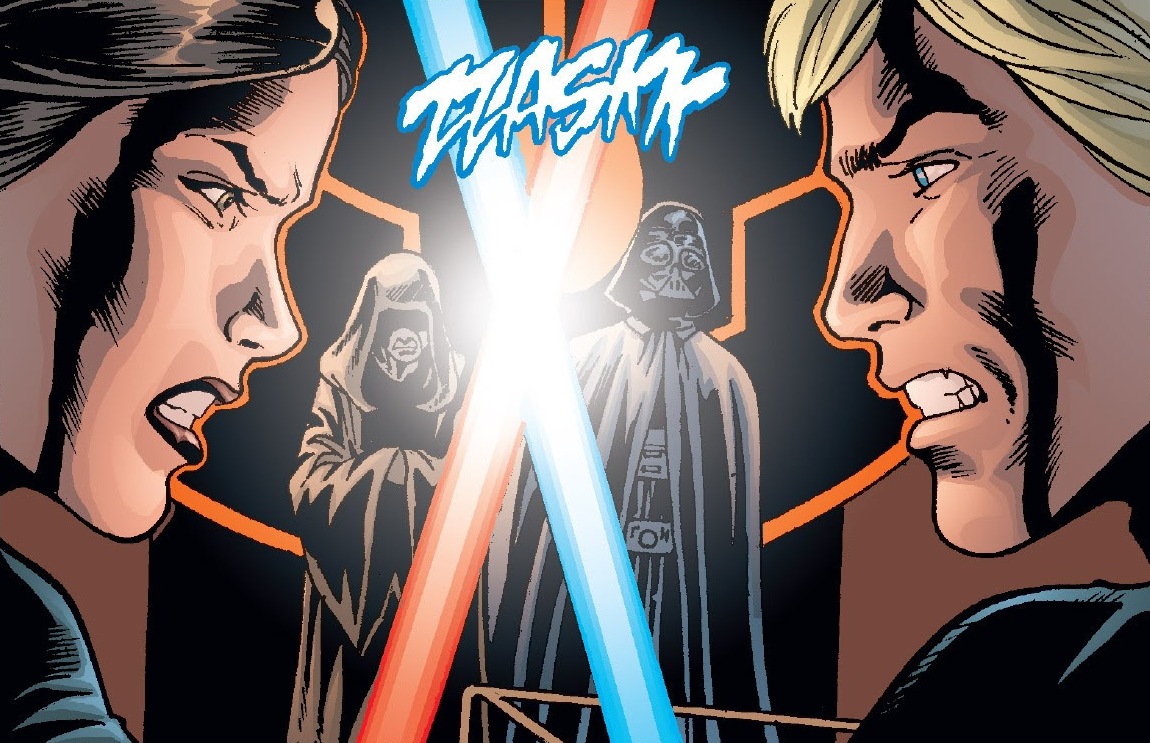
 One doesn’t go into Star Wars: Empire and Rebellion: Honor Among Thieves expecting earth-shattering events. The novel is part of a series set between A New Hope and The Empire Strikes Back, so there’s a limited scope of action. Luke can’t display any dazzling Force feats, because he still struggles with telekinesis in ESB. Han can’t fully commit to the Rebellion or romance Leia, because that hasn’t happened yet either. Leia still has room to be a Rebel leader and diplomat, but the scale of the Rebellion’s successes still has to be pretty small since they’ve just won their first truly major victory. So all in all, it can’t be very interesting, can it? The first book in this series, Razor’s Edge, was at least Leia-centric in a way that novels haven’t been for a long time, but a Han-centric book between the first two films surely has got to feel like a retread.
One doesn’t go into Star Wars: Empire and Rebellion: Honor Among Thieves expecting earth-shattering events. The novel is part of a series set between A New Hope and The Empire Strikes Back, so there’s a limited scope of action. Luke can’t display any dazzling Force feats, because he still struggles with telekinesis in ESB. Han can’t fully commit to the Rebellion or romance Leia, because that hasn’t happened yet either. Leia still has room to be a Rebel leader and diplomat, but the scale of the Rebellion’s successes still has to be pretty small since they’ve just won their first truly major victory. So all in all, it can’t be very interesting, can it? The first book in this series, Razor’s Edge, was at least Leia-centric in a way that novels haven’t been for a long time, but a Han-centric book between the first two films surely has got to feel like a retread. I started this site because I sensed a sea change coming in the wake of the Disney acquisition, and I wanted to ensure myself and some of my friends a seat at the table in setting the tone of fandom in this brave new world of sequel films and potential reboots—but never did I consider that we’d be entering the Sequel Era without Aaron Allston on our team. His work in the Star Wars Expanded Universe spans two different publishers, several decades in-universe and close to twenty years in reality; if one were inclined to pick a single EU author as The Voice of the Galaxy Far, Far Away up to this point, Allston would be right up there with Zahn or Anderson or Denning or Luceno, yet it’s always been very easy, even for his fans, to write him off as “the humor guy”.
I started this site because I sensed a sea change coming in the wake of the Disney acquisition, and I wanted to ensure myself and some of my friends a seat at the table in setting the tone of fandom in this brave new world of sequel films and potential reboots—but never did I consider that we’d be entering the Sequel Era without Aaron Allston on our team. His work in the Star Wars Expanded Universe spans two different publishers, several decades in-universe and close to twenty years in reality; if one were inclined to pick a single EU author as The Voice of the Galaxy Far, Far Away up to this point, Allston would be right up there with Zahn or Anderson or Denning or Luceno, yet it’s always been very easy, even for his fans, to write him off as “the humor guy”. could and the Star Wars Universe is going to be mourning his death for a very long time. I still can’t do a write up without crying and I specifically waited in the hopes that I could but this man had such an impact on my life from his contributions to the Star Wars Universe that I don’t think his death is something I will ever truly get over.
could and the Star Wars Universe is going to be mourning his death for a very long time. I still can’t do a write up without crying and I specifically waited in the hopes that I could but this man had such an impact on my life from his contributions to the Star Wars Universe that I don’t think his death is something I will ever truly get over. Indeed, he often appeared on the convention circuit hosting panels on writing — sometimes alongside other Star Wars authors such as Michael Stackpole or Timothy Zahn. He eagerly shared his tips and experiences in writing, and I’ve heard from several people that these panels were not to be missed. Several of my friends made annual appearances at these more general fandom conventions, and they always told me how Allston also made regular attendance at these conventions. He would go out to brunch with his fans, or hang out with them after his panels are finished. He would pose for photos and chat amiably with all comers. To those friends, he was basically like a family member they saw every year and they feel his loss keenly.
Indeed, he often appeared on the convention circuit hosting panels on writing — sometimes alongside other Star Wars authors such as Michael Stackpole or Timothy Zahn. He eagerly shared his tips and experiences in writing, and I’ve heard from several people that these panels were not to be missed. Several of my friends made annual appearances at these more general fandom conventions, and they always told me how Allston also made regular attendance at these conventions. He would go out to brunch with his fans, or hang out with them after his panels are finished. He would pose for photos and chat amiably with all comers. To those friends, he was basically like a family member they saw every year and they feel his loss keenly. himself) pop from the pages and feel like people we could relate to. Most of all, Aaron possessed an uncanny ability to weave humor into Star Wars stories that remains unmatched by anyone, anywhere. The witty quips, the funniest lines, and the most outrageous plots often came from Aaron’s pen.
himself) pop from the pages and feel like people we could relate to. Most of all, Aaron possessed an uncanny ability to weave humor into Star Wars stories that remains unmatched by anyone, anywhere. The witty quips, the funniest lines, and the most outrageous plots often came from Aaron’s pen.